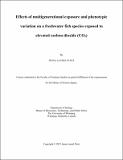| dc.contributor.author | Fleet, Jenna Laurel | |
| dc.date.accessioned | 2021-09-02T20:50:34Z | |
| dc.date.available | 2021-09-02T20:50:34Z | |
| dc.date.issued | 2021-08-11 | |
| dc.identifier.citation | Fleet, Jenna Laurel. Effects of multigenerational exposure and phenotypic variation on a freshwater fish species exposed to elevated carbon dioxide (CO2); A thesis submitted to the Faculty of Graduate Studies in partial fulfillment of the requirements for the Master of Science degree, Department of Biology, Master of Bioscience, Technology, and Public Policy, The University of Winnipeg. Winnipeg, Manitoba, Canada: University of Winnipeg, 2021. DOI: 10.36939/ir.202109021535. | en_US |
| dc.identifier.uri | https://hdl.handle.net/10680/1969 | |
| dc.description.abstract | The amount of dissolved carbon dioxide (CO2) and the acidity of aquatic ecosystems is increasing as atmospheric CO2 concentrations increase due to human activities. Changes in pH and dissolved CO2 can have considerable aversive effects on fish physiology and behaviour, which can result in negative effects on fish populations. Multigenerational studies have found that the conditions experienced by parents can have significant effects on the performance of their offspring and understanding these effects can help to predict how fish populations will cope in future conditions. Additionally, repeatable behavioural phenotypes are good predictors of trends in behaviour, can be useful predictors of other physiological and life history traits, and can be subject to selection pressures. Unfortunately, the effects of elevated CO2 on freshwater fishes over multiple generations, and the effects of behavioural phenotypes, are poorly understood. In my thesis, freshwater Japanese Medaka (Oryzias latipes) were used to investigate the influence of phenotypic variation and differences in time of exposure (generational) on biological responses to elevated CO2. Lab-reared medaka were divided into ‘responsive’ and ‘non-responsive’ groups based on behavioural differences from the population mean during acute exposure to high CO2 in a common shuttling and novel tank behavioural assay. Responsive and non-responsive fish in parental generation (P) were subdivided and exposed to either control (~480 ppm) or high CO2 (~1250 ppm) conditions over a 6-week period. Following this time, eggs from this generation were collected and randomly selected into either high or control conditions, where they were hatched and reared until maturation (filial generation one (F1), 18 weeks). Eggs from F1 were collected and hatched and reared in the same conditions as their parents until adulthood (filial generation two (F2), 24 weeks). Body condition (size, weight and length), behaviour (total distance moved, time spent in the outer zone of the behavioural arena, and swimming direction), reproductive (number of eggs, size of eggs, and survival to hatch) performance, and the relative abundance of various mRNA transcripts in whole brain tissue of fish was measured across these three generations. Behavioural phenotypes influenced reproduction for P and F2 generation fish, and growth for F1 and F2 fish; suggesting that intraspecific variation in behavioural phenotypes may influence how medaka respond to elevated CO2. However, behavioural phenotypes did not have a significant effect on mRNA abundance on genes targeted in my study. Multigenerational exposure to elevated CO2 were shown to improve the performance of offspring in some measures and resulted in changes of mRNA abundance of several genes. Transgenerational exposure, where a parent or grandparent was exposed to elevated CO2 but the offspring were not exposed to elevated CO2, resulted in some deleterious effects suggesting that, generally, exposure to environmental conditions that differ from that of their parents may put fish especially at risk. In my thesis, current CO2 exposure appeared to be the best predictor of overall condition, where fish exposed to elevated CO2 were worse off than fish exposed to control CO2 conditions. The results of this research contribute to filling a current gap of knowledge in understanding how freshwater fish will respond to future conditions over an ecologically-relevant time scale. Importantly, this information will contribute to generating more informed decisions on freshwater ecosystem management and future research directions. Marine and freshwater environments offer food and water security and are of high importance to the economy and the health of our planet, making my research relevant to our broader society. | en_US |
| dc.description.sponsorship | "This research was funded by a Natural Sciences and Engineering Research Council (NSERC) NSERC Discovery Grant, and a Research Manitoba Early Career Researcher Grant held by C. T. Hasler, and I was supported by an NSERC Canada Graduate Scholarship." | en_US |
| dc.language.iso | en | en_US |
| dc.publisher | University of Winnipeg | en_US |
| dc.rights | info:eu-repo/semantics/openAccess | en_US |
| dc.subject | Multigenerational | en_US |
| dc.subject | Behavioural phenotype | en_US |
| dc.subject | Carbon dioxide | en_US |
| dc.subject | Climate change | en_US |
| dc.subject | Freshwater fish | en_US |
| dc.subject | Behaviour | en_US |
| dc.subject | Reproduction | en_US |
| dc.subject | Growth | en_US |
| dc.title | Effects of multigenerational exposure and phenotypic variation on a freshwater fish species exposed to elevated carbon dioxide (CO2) | en_US |
| dc.type | Thesis | en_US |
| dc.description.degree | Master of Bioscience, Technology, and Public Policy | en_US |
| dc.publisher.grantor | University of Winnipeg | en_US |
| dc.identifier.doi | 10.36939/ir.202109021535 | en_US |
| thesis.degree.discipline | Bioscience, Technology, and Public Policy | |
| thesis.degree.level | masters | |
| thesis.degree.name | Master of Bioscience, Technology, and Public Policy | |
| thesis.degree.grantor | University of Winnipeg | |

